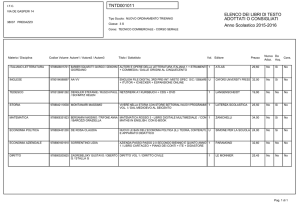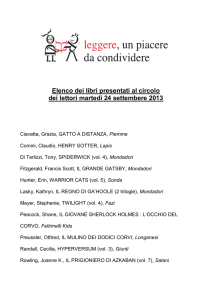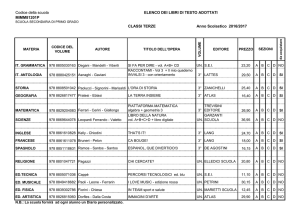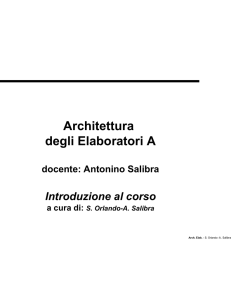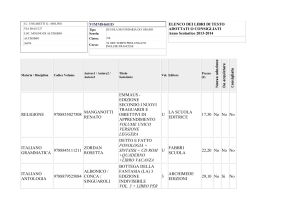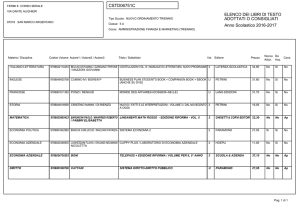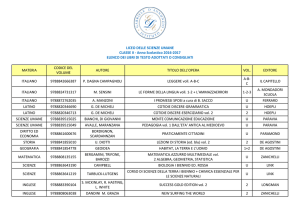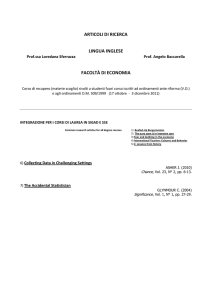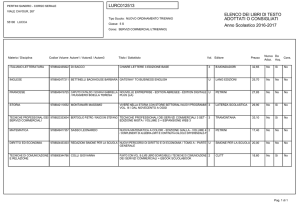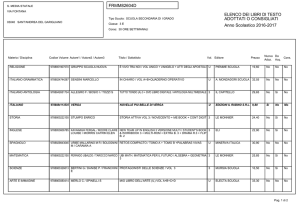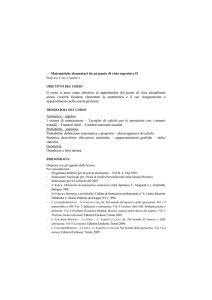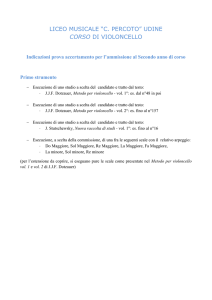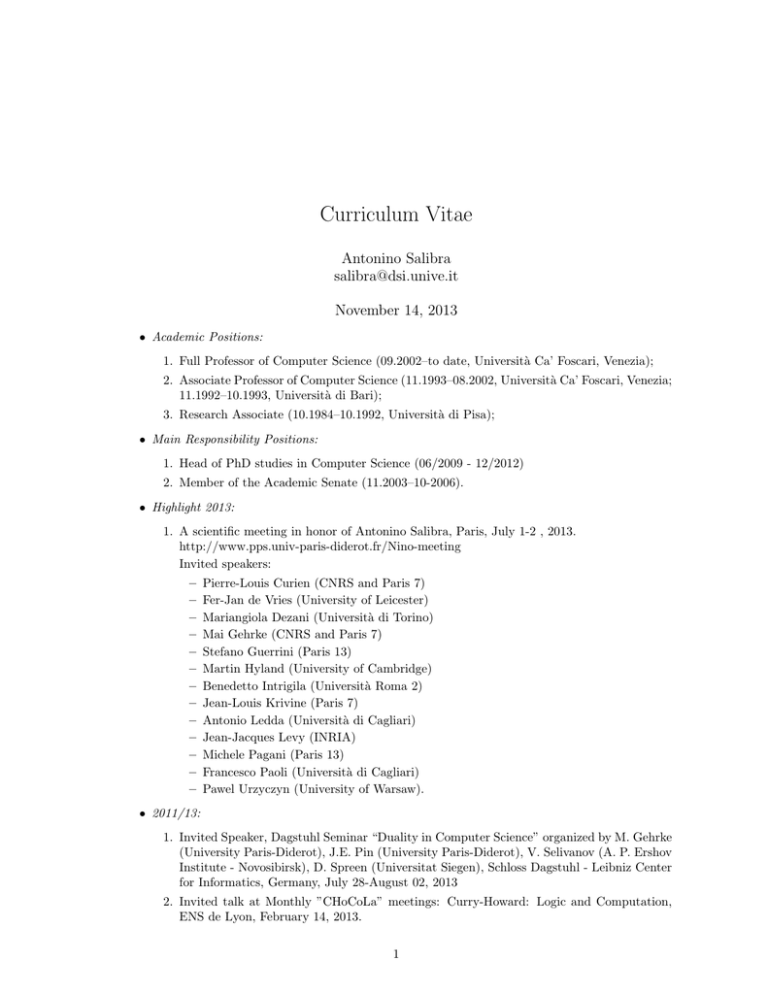
Curriculum Vitae
Antonino Salibra
[email protected]
November 14, 2013
• Academic Positions:
1. Full Professor of Computer Science (09.2002–to date, Università Ca’ Foscari, Venezia);
2. Associate Professor of Computer Science (11.1993–08.2002, Università Ca’ Foscari, Venezia;
11.1992–10.1993, Università di Bari);
3. Research Associate (10.1984–10.1992, Università di Pisa);
• Main Responsibility Positions:
1. Head of PhD studies in Computer Science (06/2009 - 12/2012)
2. Member of the Academic Senate (11.2003–10-2006).
• Highlight 2013:
1. A scientific meeting in honor of Antonino Salibra, Paris, July 1-2 , 2013.
http://www.pps.univ-paris-diderot.fr/Nino-meeting
Invited speakers:
–
–
–
–
–
–
–
–
–
–
–
–
–
Pierre-Louis Curien (CNRS and Paris 7)
Fer-Jan de Vries (University of Leicester)
Mariangiola Dezani (Università di Torino)
Mai Gehrke (CNRS and Paris 7)
Stefano Guerrini (Paris 13)
Martin Hyland (University of Cambridge)
Benedetto Intrigila (Università Roma 2)
Jean-Louis Krivine (Paris 7)
Antonio Ledda (Università di Cagliari)
Jean-Jacques Levy (INRIA)
Michele Pagani (Paris 13)
Francesco Paoli (Università di Cagliari)
Pawel Urzyczyn (University of Warsaw).
• 2011/13:
1. Invited Speaker, Dagstuhl Seminar “Duality in Computer Science” organized by M. Gehrke
(University Paris-Diderot), J.E. Pin (University Paris-Diderot), V. Selivanov (A. P. Ershov
Institute - Novosibirsk), D. Spreen (Universitat Siegen), Schloss Dagstuhl - Leibniz Center
for Informatics, Germany, July 28-August 02, 2013
2. Invited talk at Monthly ”CHoCoLa” meetings: Curry-Howard: Logic and Computation,
ENS de Lyon, February 14, 2013.
1
3. Invited Speaker, 37th International Symposium on Mathematical Foundations of Computer
Science (MFCS 2012), August 27–31, 2012, Bratislava, Slovakia.
4. Mars-Avril 2012. Laboratoire PPS, Université Paris 7-Denis Diderot. Groupe de travail en
“Algebras and lambda-theories”, une série d’exposés d’Antonino Salibra
5. Computability Theory, Summer School AILA (Associazione Italiana di Logica e sue Applicazioni), August 2011.
• Sabbatical leaves:
1. 2013: Invited Professor, CNRS et Paris 7 (three months).
2. 2012: Invited Professor, Fondation de Mathematique de Paris (two months).
3. 2002, 2005, 2007, 2008, 2009, 2011: Invited Professor, Equipe PPS, Université Paris 7-Denis
Diderot (one month, each time);
4. 2007: Chargé de Recherche, LIX, École Polytechnique, Palaiseau (two months);
5. 2003: Invited Professor, Hungarian Academy of Sciences, Budapest (one month);
6. 1996-1997: Invited Professor, Mathematics Department, Victoria University of Wellington
(three months);
7. 1992: Invited Professor, Mathematics Department, Iowa State University (two months).
• Qualifications: Qualification aux fonctions de Professeur des Universités, Section: 27-(Informatique),
France.
• Research area: Logic, Theoretical Computer Science and Universal Algebra. The main research
subjects include Lambda Calculus; Abstract Algebras; Linear Logic; Equational Logic; Variable
Binding; Abstract Model Theory and Algebraic Logic; Abstract Data Types.
• PhD Students: Stefania Lusin, PhD thesis, 2002. Giulio Manzonetto, PhD thesis, February
2008. Alberto Carraro, PhD thesis, Mars 2011. Giordano Favro, (2012-2015).
• Awards:
1. Giulio Manzonetto, Best PhD thesis of Fondation d’entreprise EADS, France, Supervisors:
Chantal Berline (CNRS et Paris 7) and Antonino Salibra (Ca’Foscari).
2. Alberto Carraro, Award Research Ca’Foscari 2012, PhD Supervisors: Antonio Bucciarelli
(Paris 7) and Antonino Salibra (Ca’Foscari).
• Teaching activity was for the Undergraduate Courses on Computer Science Curriculum. I also
gave post-graduated courses on lambda calculus at the Hungarian Academy of Sciences (2003),
at the University of Bologna (1995) and at the University of Venezia (2002). Four lessons were
given at Scuola di Dottorato in Filosofia ed Epistemologia, Università di Cagliari (2013).
• Program committee member of the International Conference in Computer Science Logic (CSL08), the annual conference of the European Association for Computer Science Logic (EACSL),
Bologna-Bertinoro, Italy, September 15-20, 2008.
• Recent Research Projects:
– Project PRIN 2010, (2012-2014). head project DI NOLA Antonio code 2010FP79LR.
– Control and certification of the resources, 2007-2009 (MURST; head project Simona Ronchi
della Rocca, Università di Torino)
– MyThS Models and Types for Security in Mobile Distributed Systems, Contract IST-200132617, European project. (Head of the project: V. Sassone, University of Sussex)
2
– FOLLIA, FOndazioni Logiche di LInguaggi Astratti di Programmazione, 2005-2006 (MURST,
Italian Minister of University and Technological Research). (Head of the project: S. Ronchi
della Rocca, University of Torino).
– CoMeta Computational Metamodels 2002-2003 (MURST, Italian Minister of University
and Technological Research). (Head of the project: F. Honsell, University of Udine).
• Recent Invited Lectures:
[S-7] 2013: Invited talk at Dagstuhl Seminar “Duality in Computer Science”, Germany, July
28-August 02, 2013.
[S-6] 2013: Invited talk at École Normale Supérieure de Lyon, February 14, 2013.
[S-5] 2012: MFCS 2012, 37th International Symposium on Mathematical Foundations of Computer Science, August 27–31, 2012 Bratislava, Slovakia.
[S-4] 8-10 June 2010: AsubL4, Algebra and Substructural Logics - take four, Ishikawa Hightech
Center at Jaist. Kanazawa, Japon.
[S-3] 4-5 Juin 2009: Conference dedicated to Chantal Berline, PPS et CNRS, Paris, France
[S-2] 28-29 Avril 2006: Geometria della Logica (Incontro di studio di Logica Matematica,
Filosofia e Informatica) Roma, 28-29 April 2006
[S-1] 25-27 August 2003: “Lambda calculus: models and theories”; AMiLP-3, Third AMAST
Workshop on Algebraic Methods in Language Processing, Verona
Submitted Articles
[1] A. Salibra, A. Ledda, F. Paoli. Factor Varieties. Preprint, November 2013
International Journals
[2] A. Carraro, A. Salibra. Ordered models of the lambda calculus. Logical Methods in Computer
Science (to appear), 2013
[3] A. Ledda, F. Paoli, A. Salibra. On Semi-Boolean-Like Algebras. Acta Univ. Palacki. Olomuc.,
Fac. rer. nat., Mathematica Vol. 52(1), 101–120, 2013.
[4] A. Salibra, A. Ledda, F. Paoli and T. Kowalski. Boolean-like-algebras. Algebra Universalis, Vol.
69(2), 113–138, 2013.
[5] A. Carraro, A. Salibra. Easy lambda-terms are not always simple. RAIRO - Theoretical Informatics and Applications vol. 46(2), 291–314, 2012.
[6] G. Manzonetto and A. Salibra, Applying Universal Algebra to Lambda Calculus, Journal of Logic
and Computation vol. 20, 877–915, 2010.
[7] C. Berline, G. Manzonetto and A. Salibra. Effective Lambda Models Versus Recursively Enumerable Lambda Theories. Mathematical Structures in Computer Science vol. 19(5), 897–942,
2009.
[8] A. Bucciarelli, A. Salibra, Graph lambda theories. Mathematical Structures in Computer Science,
Vol. 18, Issue 5, (2008), 975–1004.
3
[9] C. Berline, A. Salibra, Easiness in graph models. Theoretical Computer Science vol. 354, Issue 1
(2006), 4–23.
[10] S. Lusin, A. Salibra, The lattice of lambda theories. Journal of Logic and Computation, Vol. 14
n.3 (2004), 373–394.
[11] A. Salibra, Topological incompleteness and order incompleteness of the lambda calculus. ACM
Transactions on Computational Logic vol. 4 (2003), 379–401.
[12] S. Lusin, A. Salibra, A note on absolutely unorderable combinatory algebras. Journal of Logic
and Computation, Vol. 13 n.4 (2003), 481–582.
[13] A. Salibra Nonmodularity results for lambda calculus. Fundamenta Informaticae, vol. 45 (2001),
379–392.
[14] A. Salibra On the algebraic models of lambda calculus. Theoretical Computer Science, vol. 249
(2000), 197–240.
[15] A. Salibra, R. Goldblatt, A finite equational axiomatization of the functional algebras for the
lambda calculus. Information and Computation vol. 148 (1999), 71–130
[16] D. Pigozzi, A. Salibra, Lambda abstraction algebras: coordinatizing models of lambda calculus.
Fundamenta Informaticae vol. 33 (1998), 149–200.
[17] A. Salibra, G. Scollo, Interpolation and Compactness in categories of pre-institutions. Mathematical Structures in Computer Science vol. 6 (1996), 261–286.
[18] D. Pigozzi, A. Salibra, The abstract variable-binding calculus. Studia Logica, vol. 55, n. 1 (1995),
129–179.
[19] D. Pigozzi, A. Salibra, Lambda abstraction algebras: representation theorems. Theoretical
Computer Science, vol. 140 (1995), 5–52.
[20] A. Salibra, G. Scollo, A reduction scheme by pre-institution transformations” (abstract), Journal
of Symbolic Logic vol. 58 (1993), 1130–1131.
[21] V. Manca, A. Salibra, Soundness and Completeness of the Birkhoff Equational Calculus for
Many-sorted Algebras with Possibly Empty Carrier Sets. Theoretical Computer Science vol. 94
(1992), 101–124.
[22] V. Manca, A. Salibra, G. Scollo, Introducing equational type logic” (abstract), Journal of
Symbolic Logic vol. 56 (1991), 1132.
[23] V. Manca, A. Salibra, G. Scollo, Equational Type Logic. Theoretical Computer Science vol. 77
(1990), 131–159.
[24] V. Manca, A. Salibra, First-order Theories as Many-sorted Algebras. Notre Dame Journal of
Formal Logic vol. 25 (1984), 86–94.
Proceedings of International Conferences
[25] A. Ledda, T. Kowalski, F. Paoli, A. Salibra. Boolean like algebras. Proceedings of the 6th
Topology, Algebra and Categories in Logic (TACL 2013). N. Galatos, A. Kurz, C. Tsinakis
(eds.), TACL 2013 (EPiC Series, vol. 123), pp. 140–143, Vanderbilt University, Nashiville, USA,
July 2013.
4
[26] A. Carraro, T. Ehrhard, A. Salibra. The stack calculus. In Delia Kesner and Petrucio Viana:
Proceedings Seventh Workshop on Logical and Semantic Frameworks, with Applications (LSFA
2012), Rio de Janeiro, Brazil, September 29-30, 2012, Electronic Proceedings in Theoretical
Computer Science vol. 113, pp. 93–108.
[27] A. Bucciarelli, A. Carraro, A. Salibra. Minimal lambda theories by ultraproducts. In Delia Kesner
and Petrucio Viana: Proceedings Seventh Workshop on Logical and Semantic Frameworks, with
Applications (LSFA 2012), Rio de Janeiro, Brazil, September 29-30, 2012, Electronic Proceedings
in Theoretical Computer Science vol. 113, pp. 61–76.
[28] A. Carraro, A. Salibra. On the equational consistency of order-theoretic models of the lambda
calculus. CSL’12, 21st EACSL Annual Conferences on Computer Science Logic, September 3-6,
2012 Fontainebleau, France Patrick Cgielski and Arnaud Durand (Eds.), LIPICS Vol. 16, pp.
152–166, 2012.
[29] A. Salibra Scott is always simple (Invited Lecture). MFCS’12, 37th International Symposium
on Mathematical Foundations of Computer Science, August 27 - 31, 2012 Bratislava, Slovakia.
LNCS 7464, pp. 31–45, Springer-Verlag, 2012.
[30] A. Carraro, T. Ehrhard, A. Salibra. Resource Combinatory Algebras. MFCS’10, 35th International Symposium on Mathematical Foundations of Computer Science, LNCS 6281, pp. 233–245,
Springer, 2010. ISBN: 978-3-642-15154-5
[31] A. Carraro, T. Ehrhard, A. Salibra. Exponentials with infinite multiplicities. Proc. of 19th
EACSL Annual Conference on Computer Science and Logic (CSL’10), LNCS 6247, pp. 170–184,
Springer, 2010. ISBN 978-3-642-15204-7
[32] A. Bucciarelli, A. Carraro, T. Ehrhard, A. Salibra. On Linear Information Systems. First International Workshop on Linearity (Linearity’09), Coimbra, Portugal, 2009. Electronic Proceedings
TCS vol.22, 2010, pp. 38-48.
[33] G. Manzonetto and A. Salibra. Lattices of equational theories as Church algebras. Proceedings of
Seventh Panhellenic Logic Symposium, July 15-19, 2009, Patras, Greece. Patras University Press,
pp. 117–121. ISBN: 978-960-530-108-8
[34] A. Carraro and A. Salibra. Reflexive domains are not complete for the extensional lambdacalculus. Proceedings of 24st Annual IEEE Symposium on Logic in Computer Science (LICS’09),
Los Angeles, USA, August 11th–14th, 2009. IEEE Computer Society Publications, pp. 91-100,
2009. ISBN: 978-0-7695-3746-7
[35] G. Manzonetto and A. Salibra, From Lambda Calculus to Universal Algebra and Back, Proceedings of 33rd International Symposium on Mathematical Foundations of Computer Science,
Torun, Poland, August 25-29, 2008. LNCS 5162, Springer-Verlag, Berlin, pp. 479-490, 2008.
ISBN: 978-3-540-85237-7
[36] C. Berline, G. Manzonetto, A. Salibra, Lambda theories of effective lambda models, Proc. of 16th
EACSL Annual Conference on Computer Science and Logic (CSL’07), LNCS 4646, SpringerVerlag, pp. 268-282, 2007. ISBN: 978-3-540-74914-1
[37] G. Manzonetto, A. Salibra, Boolean algebras for lambda calculus. Proceedings of 21st Annual
IEEE Symposium on Logic in Computer Science (LICS’06), Seattle, Washington, USA, August
12th–15th, 2006. IEEE Computer Society Publications, pp. 317–326, 2006.
[38] A. Bucciarelli, A. Salibra, The sensible graph theories of lambda calculus. Proceedings of 19th
Annual IEEE Symposium on Logic in Computer Science (LICS’04), Turku, Finland, July 13–18,
2004, IEEE Computer Society Publications, pp. 276–285, 2004.
5
[39] A. Bucciarelli, A. Salibra The minimal graph model of lambda calculus. Proc. 27th International
Symposium on Mathematical Foundations of Computer Science, LNCS 2747, Springer-Verlag,
pp. 300-307, 2003.
[40] A. Salibra Lambda calculus: models and theories (Invited Lecture). Proceedings of the Third
AMAST Workshop on Algebraic Methods in Language Processing (AMiLP-2003), F. Spoto, G.
Scollo and A. Nijhol eds., TWLT Proceedings Series n.21, University of Twente (2003), 39-54.
[41] A. Salibra A continuum of theories of lambda calculus without semantics. Proceedings of 16th
Annual IEEE Symposium on Logic in Computer Science (LICS’01), Boston, USA, June 16–19,
2001, IEEE Computer Society Publications (2001), 334-343.
[42] A. Salibra Towards lambda calculus order-incompleteness. Workshop on Böhm theorem: applications to Computer Science Theory (BOTH 2001), Electronics Notes in Theoretical Computer
Science Vol. 50 No. 2, Elsevier Science B, V. (2001), 147–160.
[43] A. Salibra On categorical frames, universal algebra and Boolean algebras with operators in a
category (Invited Lecture). Proc. Workshop on Abstract Algebraic Logic Bellaterra, Spain, July
1–5, 1997. (J. Font, R. Jansana, D. Pigozzi eds.), CRM Quaderns num. 10/ gener (1998), 176–185.
[44] A. Salibra, The variety of lambda abstraction algebras does not admit n-permutable congruences
for all n. 4th International Seminar RelMiCS, (Ewa Orlowska and Andrzej Szalas eds.), Warsaw,
Poland, Septermber 14-20, 1998.
[45] D. Pigozzi, A. Salibra, Dimension-complemented lambda abstraction algebras. Proc. 3rd International Conference on Algebraic Methodology and Software Technology (AMAST’93), Enschede,
Olanda, 21–25 June 1993, (M. Nivat, C. Rattray, T. Rus, G. Scollo eds.), Workshops in Computing, Springer, London (1994), 131–138.
[46] D. Pigozzi, A. Salibra, A representation theorem for lambda abstraction algebras. Proc. 18th International Symposium on Mathematical Foundations of Computer Science, (A.M. Borzyszkowski,
S. Sokolowski eds.) Lecture Notes in Computer Science vol. 711, Springer (1993), 629–639.
[47] A. Salibra, G. Scollo, Compactness and Löwenheim-Skolem properties in pre-institution categories. Algebraic Methods in Logic and in Computer Science, (C. Rauszer ed.), Banach Center
Publications vol. 28, Inst. Math. Polish Acad. Sci., Warszawa (1993), 67–94.
[48] D. Pigozzi, A. Salibra, Polyadic algebras over non-classical logics. Algebraic Methods in Logic
and in Computer Science, (C. Rauszer ed.), Banach Center Publications vol. 28, Polish Academy
of Sciences, Warszawa (1993), 51–66.
[49] A. Salibra, G. Scollo, A soft stairway to institutions. Recent Trends in Data Type Specification,
(M. Bidoit, C. Choppy eds.), Lecture Notes in Computer Science vol. 655, Springer (1993),
310–329.
[50] D. Pigozzi, A. Salibra, Introduction to lambda abstraction algebras. Proceedings of the IX Latin
American Symposium on Mathematical Logic, (Baha Blanca, 1992) Notas de Logica Matematica
vol. 38 (1993), 93–112.
[51] V. Manca, A. Salibra, G. Scollo, On the Expressiveness of Equational Type Logic. Proc. Conference on The Unified Computation Laboratory: Modelling, Specifications and Tools, (C.M.I. Rattray, R.G. Clarke eds.), Oxford University Press (1992), 85–100.
[52] A. Salibra, A General Theory of Algebras with Quantifiers. Algebraic Logic, (H. Andréka, J.D.
Monk, I. Németi eds.), Colloq. Math. Soc. J. Bolyai vol. 54, North-Holland Publishing Co.,
Amsterdam (1991), 573–620.
6
[53] V. Manca, A. Salibra, On the Power of Equational Logic: Applications and Extensions. Algebraic
Logic, (H. Andréka, J.D. Monk, I. Németi eds.), Colloq. Math. Soc. J. Bolyai vol. 54, NorthHolland Publishing Co., Amsterdam (1991), 393–412.
[54] V. Manca, A. Salibra, Equational Calculi for Many-sorted Algebras with Empty Carrier
Sets. Proc. 15th International Symposium on Mathematical Foundation of Computer Science
(MFCS’90), (B. Rovan ed.), Lecture Notes in Computer Science vol. 452, Springer (1990),
423–429.
[55] V. Manca, A. Salibra, G. Scollo, On the nature of TELLUS (a Typed Equational Logic Look
over Uniform Specification). Proc. 14th International Symposium on Mathematical Foundation
of Computer Science (MFCS’89), (A. Kreczmar, G. Mirkowska eds.), Lecture Notes in Computer
Science vol. 379, Springer (1989), 338–349.
[56] V. Manca, A. Salibra, G. Scollo, DELTA: a Deduction system integrating Equational Logic
and Type Assignment. Proc. of the first International Conference on Algebraic Methodology and
Software Technology, Iowa City, Iowa, May 23–25 (1989), 137–140.
Books
[57] S. Antonelli, V. Manca, A. Salibra, Logica del Primo Ordine. Editrice Tecnico Scientifica, Pisa,
1983.
[58] S. Antonelli, V. Manca, A. Salibra, Logica. Editrice Tecnico Scientifica, Pisa, 1981.
Proceedings of Italian Conferences
[59] A. Salibra, Universal Algebraic Semantics. Atti degli Incontri di Logica Matematica, Università
di Siena, Siena, 1986.
[60] V. Manca, A. Salibra, Algebra Universale e Logica in Computer Science. Atti degli Incontri di
Logica Matematica, Università di Siena, Siena, 1982.
Abstracts and Talks in International Conferences
[61] A. Salibra, Lambda Calculus between Algebra and Topology. A scientific meeting in honor of
Antonino Salibra Université Paris Denis-Diderot, 1-2 July 2013
[62] A. Ledda, T. Kowalski, F. Paoli, A. Salibra, On Boolean-like algebras. General Algebra and Its
Applications: GAIA 2013 La Trobe University, Melbourne, Australia, 15-19 July 2013 Slides
n.38 in http://gaia.ltumathstats.com/participants
[63] A. Ledda, T. Kowalski, F. Paoli, A. Salibra, Boolean algebra of arbitrary similarity type. Second
International Conference on Order, Algebra, and Logics: honoring Ralph McKenzie, Hiroakira
Ono, and Andrzej Wronski 06-10 June, 2011, Kraków, Poland
[64] A. Carraro, T. Ehrhard, A. Salibra, Weird models of linear logic. Algebra and Substructural
Logics take 4, 8-10 June 2010, Ishikawa Hightech Center at Jaist, 1-1 Asahidai, Nomi, Ishikawa
923-1292, Japan. Abstract at page 23 in http://www.jaist.ac.jp/rcis/asubl4/presentations/bookof-abstracts.pdf
7
[65] A. Salibra, Boolean algebra and lambda calculus. Algebraic and Topological Methods in nonclassical logics III (TANCL’07) August 5-9, 2007 St Anne’s College, University of Oxford Oxford,
England, Abstract in Topology Atlas http://at.yorku.ca/cgi-bin/abstract/caug-81
[66] A. Salibra,
Algebra and Topology in Lambda Calculus. (Plenary Presentation)
First International Conference on Order, Algebra, and Logics (TANCL’07) Department of Mathematics, Vanderbilt University, June 12-16, 2007.
Abstract in
http://www.math.vanderbilt.edu/∼oal2007/viewabstracts.php
8

